8+ Best Ecommerce Website Builders
Have you ever dreamed of launching your online store? Maybe you have a unique product idea, a passion for handcrafted goods, or simply want to reach more customers. The good news is, that building an online store has never been easier. But with dozens of eCommerce website builder platforms vying for your attention, the question becomes: which one is the perfect fit for your business?
In this article, we’ll break down the best eCommerce website builders, exploring their features, pros, cons, and pricing. Whether you’re a tech novice or a seasoned entrepreneur, we’ve got you covered.
Lusion – Multipurpose eCommerce Shopify Theme
We provide an amazing Shopify theme with fast and responsive designs. Let’s find out!
What is an eCommerce Website?
An eCommerce website is a digital storefront that allows businesses to sell products or services online. It serves as a virtual shopping mall, providing customers with a convenient platform to browse, select, and purchase items from the comfort of their own homes.
Similar to a traditional website, an eCommerce site requires a hosting provider, a content management system, and regular updates to ensure smooth operation. However, it also includes unique features tailored to the online shopping experience.
Key features of an eCommerce website:
- Product and pricing pages: These pages showcase the available products or services, often with detailed descriptions, images, and pricing information. Customers can easily navigate through these pages to find what they are looking for.
- On-demand support: To assist customers during their shopping journey, eCommerce sites offer various support channels, such as live chat, FAQ pages, community forums, email, and phone support. This ensures that customers can get help whenever they need it.
- Streamlined shopping carts: Shopping carts allow customers to add items they wish to purchase and easily view and edit the contents of their cart. This feature simplifies the purchasing process.
- Secure payment: eCommerce sites prioritize the security of customer data by implementing secure payment gateways. This allows customers to safely enter their credit card, shipping, and billing information to complete their purchases.
- Order management: eCommerce platforms typically include tools for businesses to manage orders, track inventory, and handle shipping logistics. This ensures that orders are processed efficiently and customers receive their purchases promptly.
- Marketing and analytics: Many eCommerce platforms offer built-in marketing and analytics tools to help businesses promote their products, track website traffic, and analyze customer behavior. This data can be used to improve the website and marketing strategies.
Shopify

Shopify stands as the leading eCommerce website builder for businesses of all sizes, but it particularly shines for those focused on growth. Its robust platform handles everything from small online stores to large enterprises with ease. Shopify offers an extensive app store, diverse themes, and a vast array of features to support every stage of your online business journey.
Key Features:
- Ease of Use: While incredibly powerful, Shopify remains user-friendly. Its drag-and-drop interface simplifies store creation and management.
- App Store: Access thousands of apps to enhance your store with marketing tools, shipping integrations, customer service solutions, and more.
- Themes: Choose from a vast collection of professionally designed themes, both free and paid, to tailor your store’s look and feel.
- Payment Gateways: Accept payments from various providers, including Shopify Payments (their own solution), PayPal, Stripe, and others.
- Marketing Tools: Leverage built-in features like SEO optimization, email marketing, and abandoned cart recovery to boost sales.
- Scalability: Shopify grows with your business, offering plans to accommodate increasing traffic and sales volume.
Pros:
- Powerful and feature-rich
- Excellent for scaling businesses
- Extensive app store
- Reliable customer support
Cons:
- Can be more expensive than other options
- Some features require additional apps (and costs)
- Transaction fees on external payment gateways
Pricing:
- Basic: Starts at $19/month
- Shopify: Starts at $49/month
- Advanced: Starts at $299/month
Wix
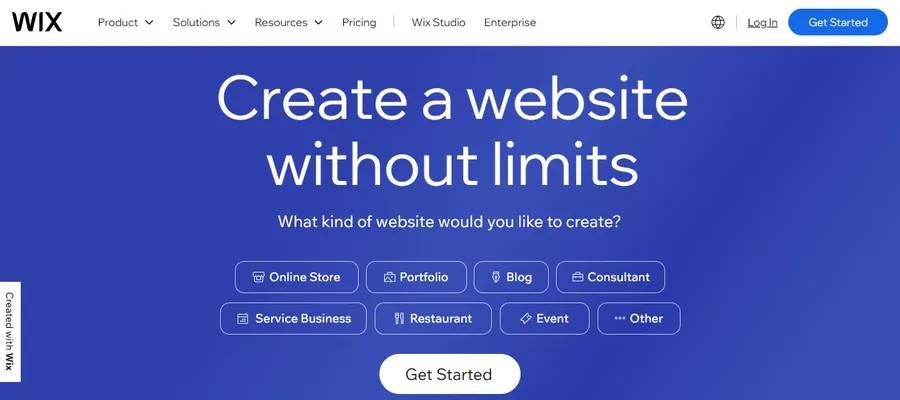
Wix is another best eCommerce website builder celebrated for its flexibility and design-focused approach. It empowers users to craft visually stunning online stores without requiring coding expertise. While not as robust as Shopify for large enterprises, Wix excels for smaller businesses and creatives seeking a highly customizable platform.
Key Features:
- Drag-and-Drop Editor: Build your store intuitively with Wix’s easy-to-use editor, placing elements precisely where you want them.
- Wix App Market: Expand your store’s functionality with apps for marketing, bookings, social media integration, and more.
- Template Variety: Choose from hundreds of beautifully designed templates, each adaptable to your brand’s unique style.
- Wix ADI (Artificial Design Intelligence): Get a head start on your store with AI-powered design assistance.
- Blogging Platform: Engage your audience with a built-in blogging platform to share news, updates, and product highlights.
Pros:
- Highly customizable design options
- User-friendly interface
- Great for creative businesses and individuals
- Extensive template library
Cons:
- Not as scalable as some competitors
- Can be slower than other platforms
- Limited product options on some plans
Pricing:
- Light plan: Starts at $17/month
- Core plan: Starts at $29/month
- Business plan: Starts at $36/month
- Business Elite plan: Starts at $159/month
Squarespace

Squarespace is renowned for its visually striking templates and design-forward approach. It helps to build eCommerce website for businesses prioritizing aesthetics and a polished online presence. While not as feature-rich as Shopify out of the box, Squarespace’s design capabilities are unmatched, making it ideal for brands that want to stand out visually.
Key Features:
- Award-Winning Templates: Select from a curated collection of stunning templates, known for their modern and elegant designs.
- Built-in Marketing Tools: Promote your store with email marketing, social media integration, and SEO optimization tools.
- Inventory Management: Track inventory levels, manage orders, and handle shipping seamlessly.
- Analytics: Gain insights into your store’s performance with detailed traffic and sales reports.
- Extensions: Enhance your store’s functionality with extensions for shipping, marketing, accounting, and more.
Pros:
- Unparalleled design options
- User-friendly interface
- Ideal for visually focused brands
- Strong blogging capabilities
Cons:
- Fewer features compared to Shopify
- Limited app store
- Less flexible customization options
Pricing:
- Personal: Starts at $16/month
- Business: Starts at $26/month
- Basic Commerce: Starts at $30/month
- Advanced Commerce: Starts at $46/month
WooCommerce
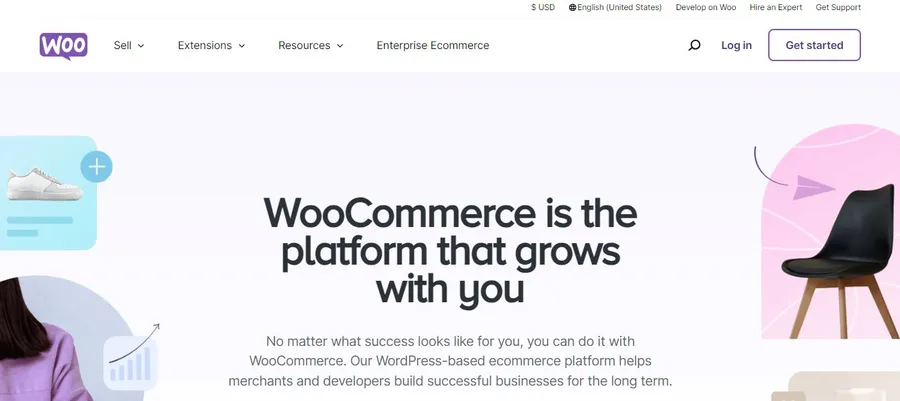
WooCommerce isn’t just an eCommerce website builder; it’s a highly customizable, open-source plugin for WordPress. This means you get immense flexibility and control over your online store, but it requires a bit more technical know-how than other platforms. If you’re already familiar with WordPress or have the resources to invest in development, WooCommerce can be an incredibly powerful solution.
Key Features:
- Limitless Customization: Modify your store’s appearance and functionality with thousands of themes and plugins, many of them free.
- Open-Source Freedom: Access the underlying code to make any changes you desire, giving you complete control.
- WordPress Integration: Seamlessly integrates with the world’s most popular content management system, offering a familiar environment.
- Massive Community: Benefit from a vast community of developers and users who create resources, tutorials, and support forums.
- SEO-Friendly: WordPress and WooCommerce are known for their SEO-friendly structure, helping your store rank higher in search results.
Pros:
- Unparalleled flexibility and control
- Cost-effective for those with development skills
- Extensive customization options
- Large and supportive community
Cons:
- Steeper learning curve
- Requires more technical knowledge
- Ongoing maintenance may be needed
- Not as user-friendly as some other platforms
Pricing:
- WooCommerce itself is free, but you’ll need a WordPress hosting plan (costs vary) and may need to purchase themes and plugins.
BigCommerce
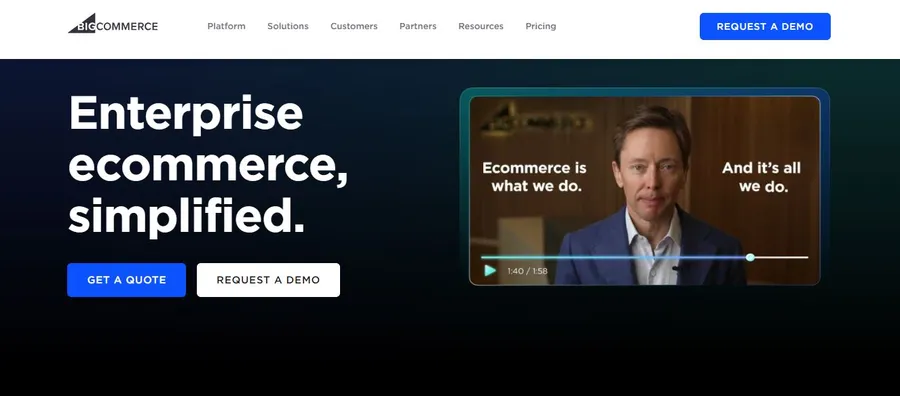
BigCommerce is one of the building eCommerce websites designed to meet the needs of growing and established businesses. It’s a comprehensive platform with a robust feature set, including advanced marketing tools, multi-channel selling capabilities, and excellent scalability. While it may be overkill for small shops, BigCommerce shines for those with ambitious growth plans.
Key Features:
- Built-in Features: Packed with features like abandoned cart recovery, product reviews, and gift certificates, eliminating the need for many third-party apps.
- Multi-Channel Selling: Sell across multiple platforms like Amazon, eBay, and Facebook, expanding your reach.
- Headless Commerce: Decouple your front-end and back-end for greater flexibility and customization.
- Scalability: Easily handle high volumes of traffic and transactions as your business grows.
- Enterprise-Grade Security: Robust security measures to protect your store and customer data.
Pros:
- Powerful and feature-rich
- Excellent for scaling businesses
- Strong multi-channel capabilities
- Reliable customer support
Cons:
- Can be more expensive than other options
- Limited theme selection
- Steeper learning curve for beginners
Pricing:
- Standard: Starts at $29/month
- Plus: Starts at $79/month
- Pro: Starts at $299/month
Weebly

Weebly is an eCommerce website builder that prioritizes ease of use and affordability. It’s a great option for beginners and small businesses who want to get their online store up and running quickly without breaking the bank. While it may not have all the bells and whistles of more advanced platforms, Weebly offers a solid foundation for simple stores.
Key Features:
- Drag-and-Drop Editor: Build your store intuitively with Weebly’s straightforward editor.
- App Center: Expand your store’s functionality with apps for marketing, social media, and more.
- Mobile-Responsive Themes: Choose from a variety of themes that look great on all devices.
- Basic SEO Tools: Optimize your store for search engines with built-in SEO features.
- Affordable Pricing: Weebly offers budget-friendly plans, making it accessible for small businesses.
Pros:
- User-friendly interface
- Affordable pricing
- Great for beginners
- Mobile-responsive designs
Cons:
- Limited customization options
- Fewer features than some competitors
- Not ideal for large or complex stores
Pricing:
- Free plan available
- Personal: Starts at $10/month
- Professional: Starts at $12/month
- Performance: Starts at $26/month
Hostinger
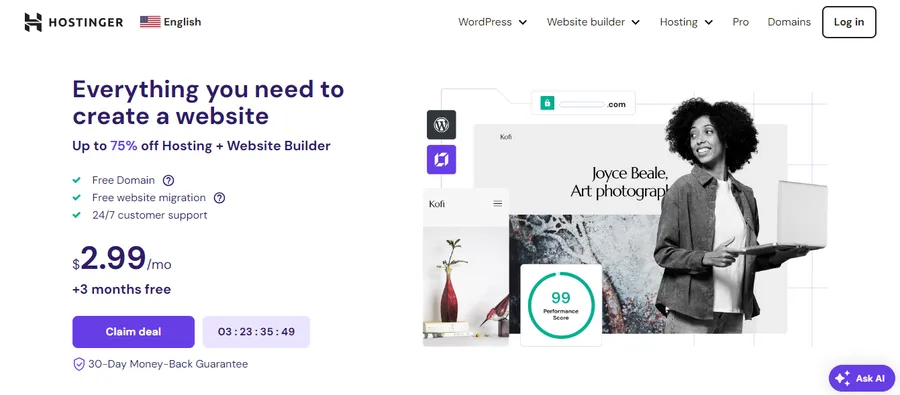
Hostinger is an affordable eCommerce website builder that’s ideal for small businesses and entrepreneurs on a budget. It offers a user-friendly interface, a variety of templates, and essential features to get your online store up and running quickly. While not as feature-rich as some competitors, Hostinger’s value proposition makes it a great starting point for beginners.
Key Features:
- Drag-and-Drop Builder: Create your store easily with Hostinger’s intuitive drag-and-drop interface.
- Template Library: Choose from a selection of modern and responsive templates to customize your store’s appearance.
- Essential Ecommerce Features: Includes product management, inventory tracking, order processing, and payment gateways.
- Affordable Pricing: Offers some of the most competitive pricing in the market, making it ideal for budget-conscious businesses.
- 24/7 Support: Get assistance whenever you need it with Hostinger’s round-the-clock customer support.
Pros:
- Very affordable pricing
- User-friendly interface
- Includes essential eCommerce features
- Good for beginners and small businesses
Cons:
- Limited features compared to other platforms
- Fewer design customization options
- Not as scalable for larger businesses
Pricing:
- Starts at $2.99/month for the basic plan.
GoDaddy
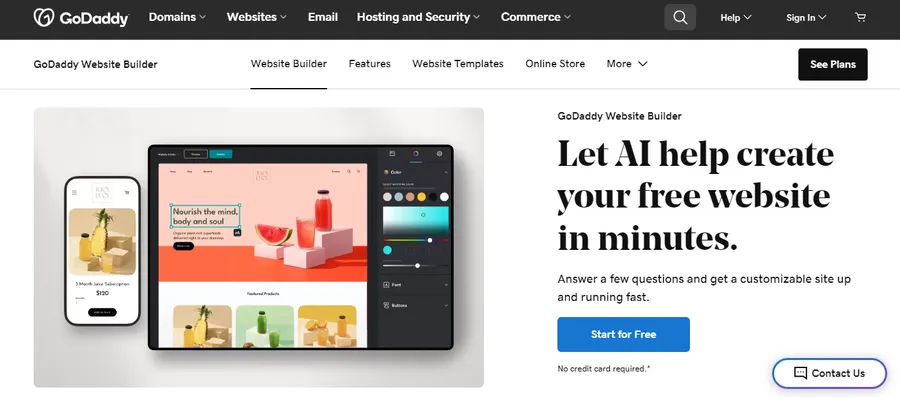
GoDaddy is a well-known name in the web hosting and domain registration industry, but it also offers a website builder eCommerce. It provides an integrated solution for businesses that want to manage their online store, hosting, and domain all in one place. GoDaddy is suitable for small to medium-sized businesses.
Key Features:
- Website Builder with Ecommerce: Easily create an online store with GoDaddy’s website builder, which includes eCommerce features.
- Integrated Domain and Hosting: Bundle your domain registration and web hosting with your eCommerce website builder plan.
- Marketing Tools: Access marketing tools like email marketing, social media integration, and SEO optimization.
- Inventory and Order Management: Easily track inventory, manage orders, and process payments.
- 24/7 Support: Get help from GoDaddy’s customer support team anytime you need it.
Pros:
- Convenient all-in-one solution
- Easy to use for beginners
- Includes marketing tools
- Affordable for small businesses
Cons:
- Limited customization options compared to other platforms
- Fewer features than some dedicated eCommerce website builders
- Can be more expensive as your store grows
Pricing:
- Starts at $9.99/month for the basic eCommerce plan.
The Bottom Line
The best eCommerce website builder is the one that aligns with your unique business needs, budget, and goals. Take advantage of free trials and demos to explore different platforms before making your final decision. Remember, building a successful online store takes time and effort, but with the right tools and strategies, you can turn your entrepreneurial dreams into reality.
Read More: Shopify vs. Amazon: Which eCommerce Platform to Choose?



